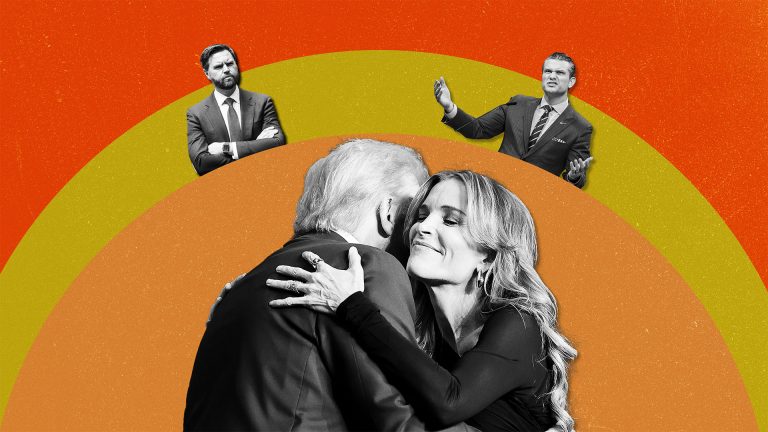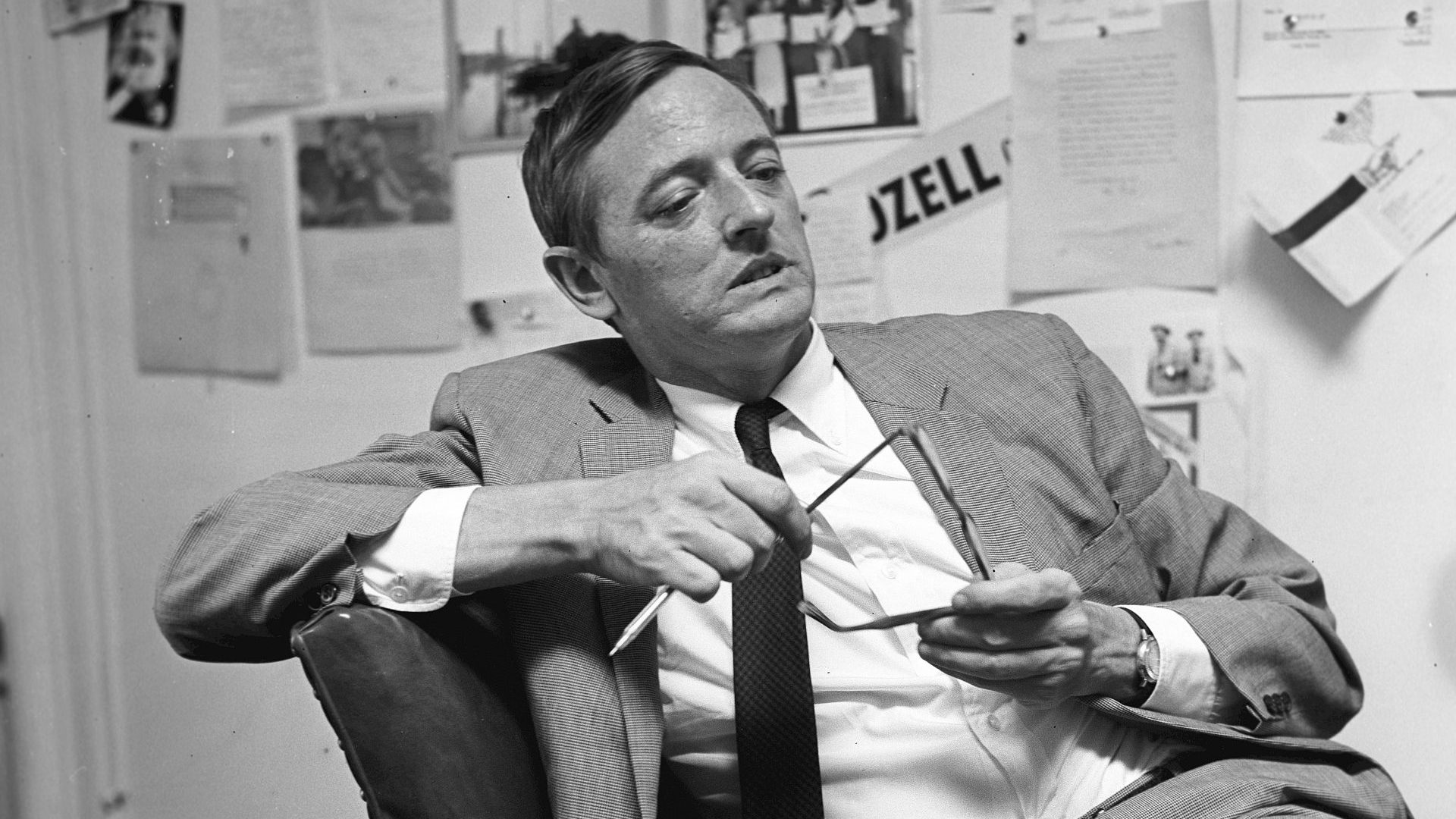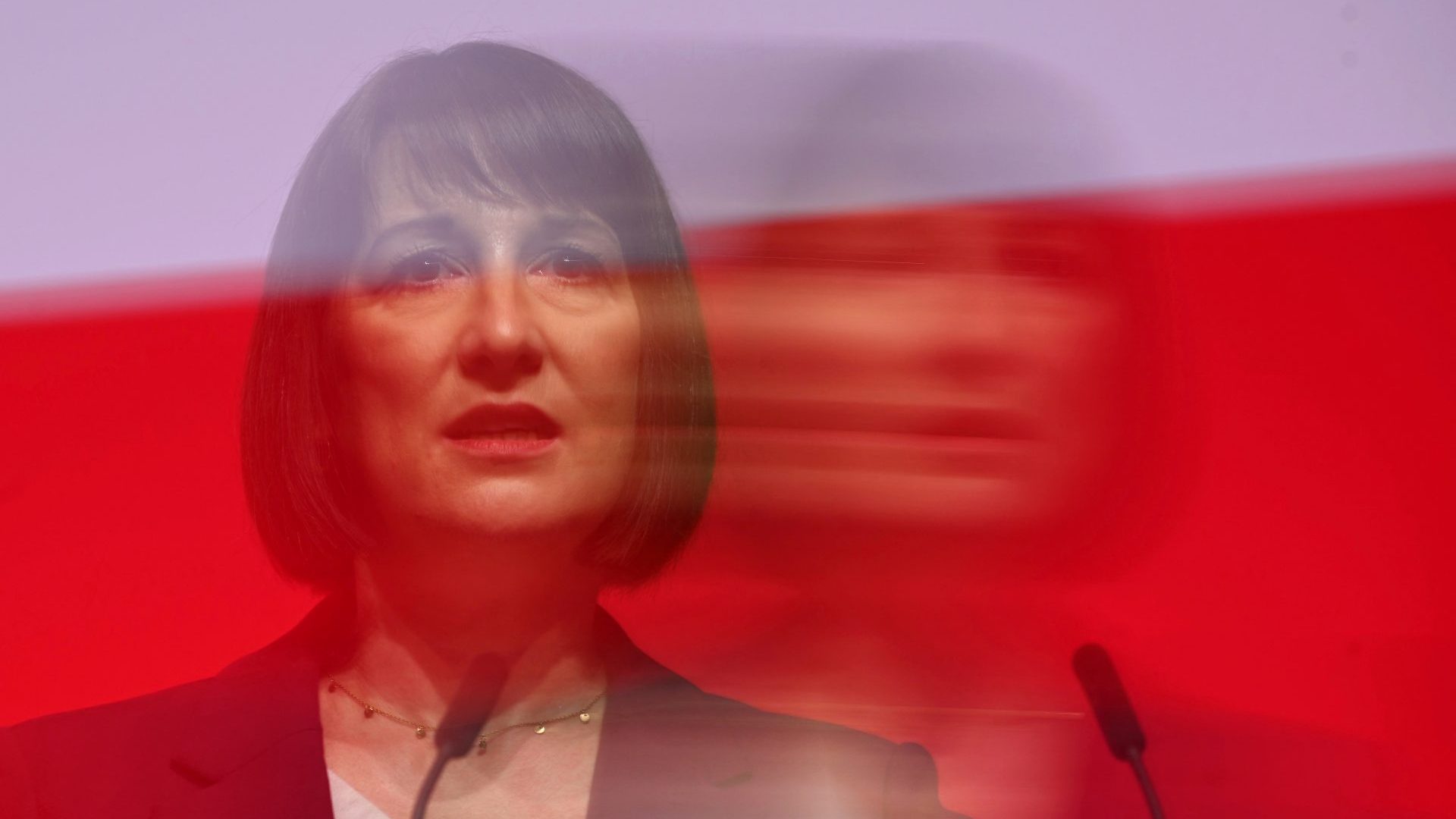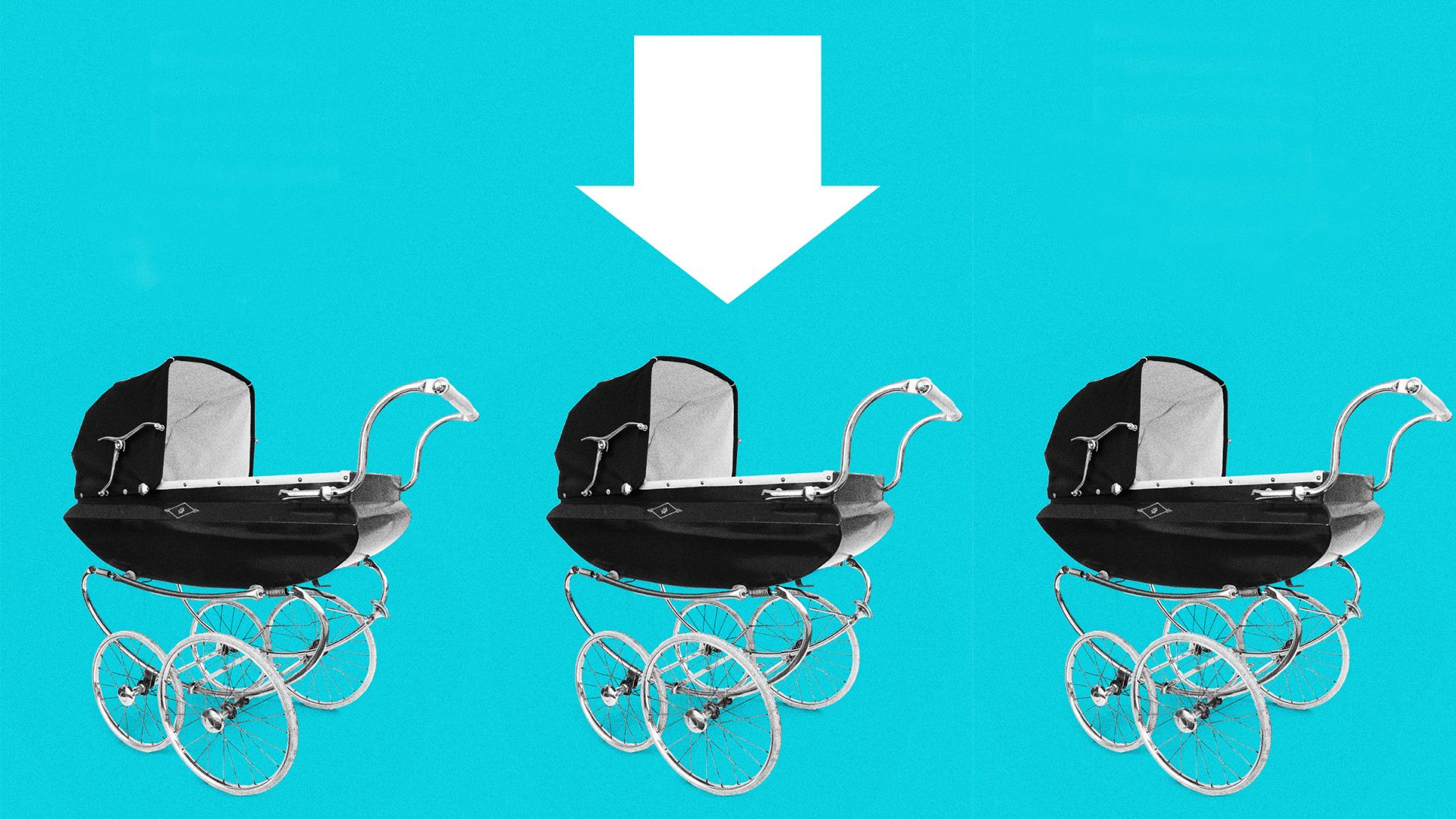A century after his birth, and 17 years since he died at the age of 82, William F Buckley Jr is still a remarkably vivid presence in political and cultural life. That this is so says much about the impact that he had in his prime. But it also reflects the enduring relevance of his legacy.
The founder of the conservative journal National Review, host for 33 years of the television show Firing Line and indefatigable right wing activist continues to energise a thriving literary-cultural industry. Best of Enemies (2015), Robert Gordon and Morgan Neville’s documentary about Buckley’s momentous debates on ABC News with Gore Vidal at the Republican and Democratic conventions in 1968, inspired an award-winning play by James Graham in 2021.
In 2019, his earlier rhetorical contest in 1965 with James Baldwin at the Cambridge Union was the focus of Nicholas Buccola’s terrific The Fire Is Upon Us. In 2015, the American historian Kevin M Schultz devoted an entire volume to Buckley’s friendship with Norman Mailer and its role in shaping the 1960s.
Meanwhile, his televisual exchanges with famous figures from Henry Kissinger via Groucho Marx to Allen Ginsberg (playing the harmonium to a rapt Buckley) have become YouTube favourites. Last year, another documentary, The Incomparable Mr Buckley, was produced by PBS in its American Masters series. And now, more than 25 years after Sam Tanenhaus was named his official biographer, the magisterial Buckley: The Life and the Revolution that Changed America (Random House) has finally been published, weighing in at more than 1,000 pages.
By design – and wisely – Tanenhaus, a former editor of the New York Times Book Review, does not allow his book to become a dual biography of Buckley and Donald Trump. Indeed, the author does not even mention his subject’s takedown of the future 45th and 47th president in (of all periodicals) the March-April 2000 issue of Cigar Aficionado (“When he looks at a glass, he is mesmerized by its reflection. If Donald Trump were shaped a little differently, he would compete for Miss America”). We’ll get back to that.
Thanks to prodigious researches, Tanenhaus, author of a seminal biography of Buckley’s National Review colleague, the ex-communist Whittaker Chambers, has delivered a landmark account of his subject’s dramatic, contentious and consequential life – and his book is both enormously readable and close to definitive (one minor grouch: he skimps on Buckley’s later years, justifying this decision on the basis that once Ronald Reagan had won the presidency and Soviet communism was defeated, his work was essentially done).
Lolling louchely in the interviewer’s chair, dressed with the crumpled elegance of the American aristocrat and speaking like an exploding thesaurus, Buckley is often assumed to have been a classic WASP (White Anglo-Saxon Protestant). But he was no such thing.
Both his parents were of Irish descent. His father, William F Buckley Sr, was born into poverty, a Texan frontiersman and oil speculator who had many hairy adventures before he became properly rich. His mother, Aloise Steiner, was a southern belle from New Orleans, a proud daughter of the Confederacy and (above all) a devout Catholic – a piety inherited by her son Bill, the sixth of 10 children.
Buckley’s unique, languorous and florid manner of speech reflected his particular relationship with English, which was his third language (he spoke only Spanish until the age of six, and French was his second). Though he made it his practice to conquer every establishment institution in his path, he never ceased to see himself as an outsider and a disruptor.
At Yale, he edited the daily newspaper, was a member of Fence, the university’s most illustrious social club, and was tapped for the secret society, Skull and Bones. Yet his first project after graduation was a ferocious attack on what he considered the corrosive secularism and liberalism endemic at his alma mater.
In the preface to God and Man at Yale (1951) – which became a bestseller and succès de scandale – Buckley spelled out what was to become his lifelong political credo: “I myself believe that the duel between Christianity and atheism is the most important in the world. I further believe that the struggle between individualism and collectivism is the same struggle reproduced on another level”.
As founder of National Review in 1955, with its mission to stand “athwart history, yelling Stop”, he gathered a coterie of self-styled “radical conservatives” (the “brigade of intellectuals” he had called for in a 1949 speech) who were very different to the moderate Republicans of the Eisenhower era. The core mission was to find a presidential candidate who would take on liberalism at home and the Soviets abroad.
In 1964, Barry Goldwater was trounced by Lyndon Johnson; Richard Nixon proved a disappointment, cosying up to China and pursuing détente with the USSR (and Buckley, a former CIA operative, a close friend of E Howard Hunt, the leader of the Watergate burglary, and godfather to three of his children, was very lucky not to get dragged into the scandal); only with Reagan’s election in 1980 did he finally get the president that he sought.
With characteristic nerve, National Review declared three weeks after its candidate’s triumph that “[t]his is therefore the last issue in which we shall indulge in levity. Connoisseurs of humor will have to get their yuks elsewhere. We have a nation to run.” Not everyone found this as funny as did the editor and his cronies.
Suggested Reading


Could Megyn Kelly become president?
Admirably, Tanenhaus explores both Buckley’s undoubted personal generosity of spirit and the grotesque views which, with varying degrees of ferocity, he held throughout his life. His father was an avowed antisemite and racist and held court to pseudo-intellectual bigots at the Buckleys’ magnificent home, Great Elm, in Sharon, Connecticut.
The son was eventually to recant his unquestioning filial obedience to many of these appalling views. “I once believed we could evolve our way up from Jim Crow,” he told Time magazine in 1995. “I was wrong. Federal intervention was necessary.”
But those were the regrets of a 70-year-old man: too little, too late. The National Review’s lowest point was an editorial in 1957 entitled “Why the South Must Prevail”, arguing that Blacks should be given the vote only when whites considered them “ready”.
Buckley was capable of developing fresh prejudices along the way, too. In 1986, he wrote a notorious op-ed for the New York Times in which he argued that everyone with Aids “should be tattooed”. The desire to shock and provoke outrage often led him to disgrace.
That said, Tanenhaus portrays a man of profound ambiguities and complexities. In 1970, for instance, he said that we “need a black President” and that electing one was something “worth working for”. He became good friends with the Black Panther Eldridge Cleaver, who once dropped by for a drink at the Buckleys’ Manhattan maisonette with Timothy Leary.
Nor was his ecumenical curiosity as a journalist and public intellectual ever in doubt: he mentored writers such as Joan Didion and John Leonard, future left wing editor of the New York Times Book Review, with as much care as he did his fellow conservatives, claiming with his trademark twinkle that he ran “a finishing school for apostates”.
So, to return to the Big Orange Elephant in the room: Trump is certainly not a lineal political descendant of Buckley. For a start, he is an arch-philistine, in stark contrast to the man who wrote more than 50 books and was a true connoisseur of classical music, especially Bach. Trump’s religion is also entirely opportunistic, whereas Buckley’s was the irreducible core of his life (for details, see his 1997 memoir, Nearer, My God: An Autobiography of Faith).
He hated tariffs. He also believed with every fibre of his being in the necessity of order as the essential precondition of liberty and would have found the uprising of January 6 traumatic and unconscionable.
Yet he cannot be acquitted of responsibility for MAGA, idolised as a wise Prospero of the right to Trump’s raging Caliban. The connective tissue between the two is stronger than Buckley’s admirers care to admit.
For a start, he was, from the age of 14, a fervent champion of the “America First” doctrine and a youthful admirer of Charles Lindbergh. On October 30, 1941, he was granted a night away from his boarding school to see his hero at Madison Square Garden: it was all “terribly exciting”, he later recalled.
For Buckley, America’s global conflict with the Soviets was necessary but exceptional. Once communism had been destroyed, he wanted the US to resume its isolationist role and renounce “Wilsonian” interventions such as the 2003 Iraq War. He would have applauded much of Trump’s foreign policy (assuming he had been able to make sense of it).
He and his close colleague James Burnham – who partly inspired O’Brien, the party boss in Orwell’s Nineteen Eighty-Four – shared a distaste for what Trump and his allies now call the “administrative state”. Burnham’s 1941 tract The Managerial Revolution: What Is Happening in the World is perhaps the closest MAGA has to a manual. And if you want to find the deepest roots of Trump’s assault on US universities – look no further than the strictures of God and Man at Yale.
Second, Buckley was the first American conservative truly to understand that the right had to mobilise its own networks and coalesce in a fiercely disciplined movement. In 1960, the Young Americans for Freedom were founded at a weekend conference at Great Elm. At least 50 members of YAF would go on to fill roles in the Reagan White House.
Buckley might not have liked Steve Bannon’s triple-shirted dress code. But he would definitely have approved of the MAGA strategist’s demand for “muzzle velocity” action and remorseless ideological organisation. The Trump movement is very different to the Buckley movement; but the former might not exist today without the latter’s pioneering successes.
Third, Buckley, for all his highbrow affectations, completely understood the role that populism would play in modern conservatism. Boorish as he found Senator Joe McCarthy, he fully endorsed his war against the supposed communist infiltration of American public life, and, with his brother-in-law, L Brent Bozell Jr, published a book in 1954 in his defence.
As Trump is today, he was a great admirer of Patrick Buchanan, the populist, isolationist culture warrior who ran for the Republican nomination in 1992. And – to the horror of some of his more delicate friends – he loved the company of Rush Limbaugh, the original right wing shock jock.
Which brings us to the heart of the matter: namely, Buckley’s pivotal role in making politics a branch of the entertainment industry. As Tanenhaus writes, his “true métier as writer and talker – eventually reaching levels approaching genius – was for intellectual comedy, an almost continual repartee”.
Yes, he was an impressive public intellectual; but the right “had always had thundering polemicists. Buckley came forward as its first intellectual entertainer”. In this sense, ideology and technology converged at precisely the right moment: he “sensed, ahead of just about everyone else, that politics was becoming a largely public spectacle”.
Central to this was his epic televisual confrontation with Vidal who, on the third night in Miami, called him “crypto-Nazi”. Losing his cool completely, Buckley replied: “Now listen, you queer! Stop calling me a crypto-Nazi or I’ll sock you in your goddamn face and you’ll stay plastered!”
Buckley thought he had blown it – maybe blown everything – but Vidal saw immediately that the two of them had changed the coverage of politics forever. Leaning over to his antagonist, he said: “Well, I guess we gave them their money’s worth tonight”.
He was right. Forty years before social media and the turbocharging of culture wars, two revered intellectuals had turned convention political discussion into dopamine-pumped conflict; pure bloodsport. ABC’s ratings soared. Every other channel followed the network’s lead, with on-air combat segments such as CBS’s Point Counterpoint and CNN’s Crossfire.
In addition to his 1,500 episodes of Firing Line, Buckley also became a regular on the big chat shows: Merv Griffin, Dick Cavett, Johnny Carson. He joked about miniskirts on NBC’s Woody Allen Looks at 1967.
Beginning a process that Trump was to perfect, he grasped completely that the best way to sell conservatism is through showbusiness and popular culture. His origins lay in lofty discussion of Michael Oakeshott, Ayn Rand and Edmund Burke, and he kept up his cerebral life in the pages of National Review. But his greatest gift to the right, in the end, was to show that you could always “own the libs” by making the audience laugh.
Buckley would have loved podcasting. He’d have had a blast at Mar-a-Lago (while mocking its vulgarities in private). He’d have needled “the contumaciously technophiliac Mr Musk” and teased “Mr Rogan for dexterously concealing a lucid brain beneath that Cro-Magnon skull”.
In November 1967, Time magazine carried a picture of Buckley on its cover, with the line: “Conservatism Can be Fun”.
Which, really, is where all our troubles began.




